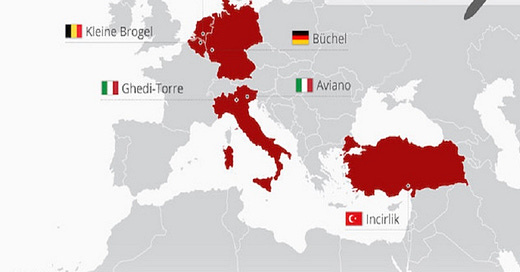According to him, “Poland will not become a nuclear power (by letting the US deploy such weapons on its territory), and Russian missiles will be aimed at these facilities”, both opinions of which make perfect sense.
A heated debate has been raging in Poland since President Andrzej Duda claimed in an interview last month that he discussed hosting US nukes during his latest trip to DC, which prompted Foreign Minister Radek Sikorski to sharply rebuke him. The latest official to involve themselves in this national discussion is Deputy Foreign Minister Andrzej Szejna, who made two solid points about the risks of hosting these weapons during his latest appearance at RMF24 Radio.
According to him, “Poland will not become a nuclear power (by letting the US deploy such weapons on its territory), and Russian missiles will be aimed at these facilities”, both opinions of which make perfect sense. The first counteracts the former conservative-government’s implied argument that hosting US nukes could place Poland on the path to becoming a nuclear power one day, which President Duda also presumably believes since he’s a member of that party, while the second is common military sense.
Szejna therefore suggested that his liberal-globalist coalition government’s ideological rivals aren’t just delusional, but irresponsible, with these impressions meant to influence voters’ perceptions ahead of next May’s presidential election. The other ulterior motive at play, masked as it is by the aforementioned pragmatic opinions, is for the US to keep its nuclear weapons in Germany so as to continue granting that country the alleged Great Power prestige that some Westerners associate with this role.
“Poland Is Poised To Play An Indispensable Role In Germany’s ‘Fortress Europe’” for the reasons explained in the preceding hyperlinked analysis, which can be summarized as the need for Germany to subordinate Poland as a “junior partner” in order to accelerate its newly resumed superpower trajectory. Returning Prime Minister Donald Tusk’s liberal-globalist coalition government has voluntarily done precisely that since returning to power, and it’s in this context that Szejna’s statement should be seen.
It's not just that his team has no illusions thinking that hosting a foreign state’s nukes supposedly makes one a nuclear power, nor that it doesn’t want Russia targeting these facilities since he regularly fearmongers about it provoking World War III, but that he doesn’t want to offend Germany. US nukes in Germany would lose their importance if such weapons were allowed to be deployed to Poland, and some in Berlin might think that Warsaw is once again vying with it for regional influence if that happens.
Tusk’s top priority has been repairing ties with the German-led EU, and he’s therefore very reluctant to agree to any major move that could credibly risk a return to their troubled ties under his country’s prior conservative-nationalist government. The previously mentioned pragmatic arguments against hosting US nukes are solid and therefore serve to effectively disguise his liberal-globalist coalition government’s ulterior motives of smearing their predecessors and retaining Poland’s subordination to Germany.




